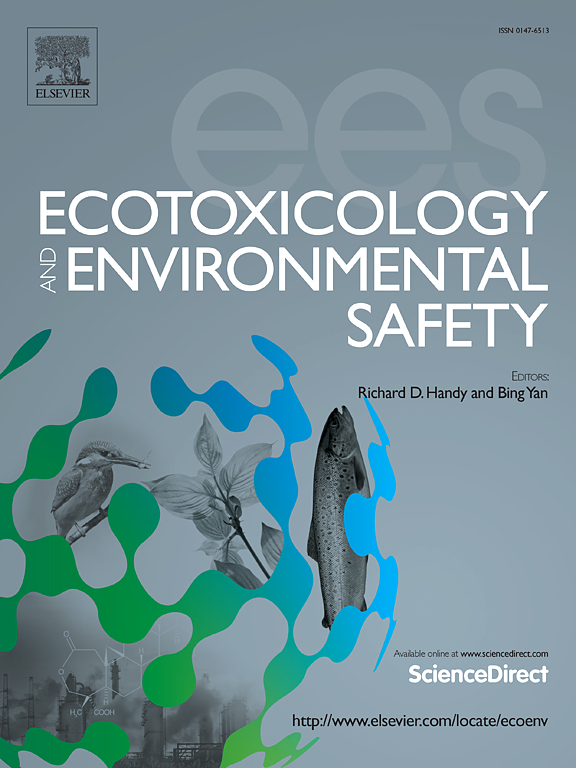The role of Drp1 – Pink1 – Parkin – mediated mitophagy in perfluorobutane sulfonate– induced hepatocyte damage
IF 6.2
2区 环境科学与生态学
Q1 ENVIRONMENTAL SCIENCES
引用次数: 0
Abstract
Perfluorobutane sulfonate (PFBS) is recognized as a highly persistent environmental contaminant, notorious for its chemical stability and enduring presence in ecosystems. Its propensity for persistence and environmental mobility allows PFBS to infiltrate the human body, predominantly accumulating in the liver where it poses a potential risk for hepatic damage. This investigation aimed to explore the outcomes of PFBS on the physiological functionalities of hepatocytes in vitro. To this end, hepatocytes were exposed to 750 ug/ml PFBS, followed by an analysis of various cellular phenotypes and functionalities, including assessments of cell viability and mitochondrial integrity. The findings indicated that PFBS exposure led to a suppression of cell proliferation and an increase in apoptotic cell death. Moreover, PFBS exposure was found to augment the generation of reactive oxygen species (ROS) and induce significant mitochondrial dysfunction. Gene expression analysis identified significant changes in genes associated with numerous tumor signaling pathways and autophagy signaling pathways. Further examinations revealed an increase in cellular mitophagy following PFBS exposure, coupled with the activation of the mitophagy-associated Drp1/Pink1/Parkin pathway. Inhibition of mitophagy was observed to concurrently amplify cellular damage and inhibit the Drp1/Pink1/Parkin pathway. Together, these findings highlight PFBS’s capacity to inflict hepatocyte injury through mitochondrial disruption, positioning Drp1/Pink1/Parkin-mediated mitophagy as a crucial cellular defense mechanism against PFBS-induced toxicity.
Drp1 - Pink1 - Parkin 介导的有丝分裂在全氟丁烷磺酸盐诱导的肝细胞损伤中的作用
全氟丁烷磺酸(PFBS)是一种公认的高持久性环境污染物,因其化学稳定性和在生态系统中的持久存在而臭名昭著。其持久性和环境流动性使全氟丁烷磺酸能够渗入人体,主要在肝脏中蓄积,对肝脏造成潜在的损害风险。这项研究旨在探索全氟辛烷磺酸对体外肝细胞生理功能的影响。为此,将肝细胞暴露于 750 微克/毫升的 PFBS,然后分析各种细胞表型和功能,包括评估细胞活力和线粒体完整性。研究结果表明,暴露于 PFBS 会抑制细胞增殖,增加细胞凋亡。此外,研究还发现暴露于 PFBS 会增加活性氧(ROS)的生成,并导致线粒体功能严重失调。基因表达分析发现,与许多肿瘤信号通路和自噬信号通路相关的基因发生了重大变化。进一步检查发现,暴露于 PFBS 后,细胞有丝分裂增加,与有丝分裂相关的 Drp1/Pink1/Parkin 通路也被激活。据观察,抑制有丝分裂会同时扩大细胞损伤并抑制 Drp1/Pink1/Parkin 通路。总之,这些发现突出了 PFBS 通过线粒体破坏对肝细胞造成损伤的能力,并将 Drp1/Pink1/Parkin 介导的有丝分裂定位为抵御 PFBS 诱导的毒性的关键细胞防御机制。
本文章由计算机程序翻译,如有差异,请以英文原文为准。
求助全文
约1分钟内获得全文
求助全文
来源期刊
CiteScore
12.10
自引率
5.90%
发文量
1234
审稿时长
88 days
期刊介绍:
Ecotoxicology and Environmental Safety is a multi-disciplinary journal that focuses on understanding the exposure and effects of environmental contamination on organisms including human health. The scope of the journal covers three main themes. The topics within these themes, indicated below, include (but are not limited to) the following: Ecotoxicology、Environmental Chemistry、Environmental Safety etc.

 求助内容:
求助内容: 应助结果提醒方式:
应助结果提醒方式:


